Last week, 10 graduate students took to the stage to compete in Dal’s annual 3 Minute Thesis (3MT) competition, with medical neuroscience PhD student Reynaldo Popoli earning this year’s winning title with his presentation on improving the quality of life for patients living with the neurological disorder ALS.
The 3MT finals, held Tuesday, March 19 in the Dalhousie Student Union Building, challenged competitors to present their research to a non-specialist audience in three engaging minutes or less, using only one static PowerPoint slide as a visual aid.
Five master’s and five PhD students shared their research, representing the Faculties of Medicine, Science and Health.
Making strides in medicine
Along with taking home the title of Dal’s newest 3MT champion after winning over the judging panel, Popoli won a cash prize of $1,000 and the opportunity to represent Dalhousie at the Eastern 3MT regionals at the Institut national de la recherche scientifique in Quebec this June.
“I feel incredibly grateful, especially to my colleagues that allowed me to practice my presentation and provided invaluable feedback,” he says.
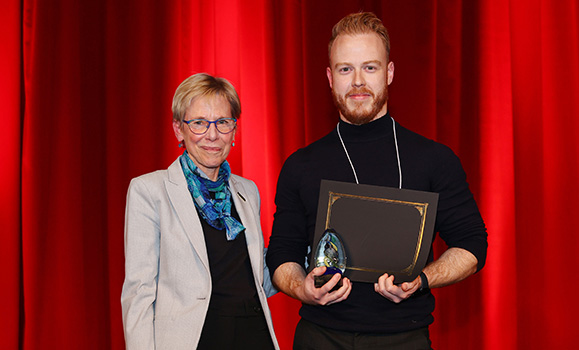
Faculty of Graduate Studies Dean Marty Leonard with Popoli.
Popoli’s presentation called attention to the devastating impacts of ALS — a disease that affects the cells in our bodies that control our muscles. These cells originate in the brain and spinal cord and travel to the muscles, forming connections called neuromuscular junctions. In ALS, the cells withdraw from the muscles, and these connections are left non-functional.
“The goal of my research is to understand some of the changes that occur in ALS. More precisely, in the connections between the cells that control our movements and their respective muscles. By understanding these changes, we hope we can use different therapeutic approaches to slow down disease progression and improve symptoms,” he says.
Popoli’s research looks at drugs that help regulate and maintain the integrity of the neuromuscular junction. He has shown that the use of these drugs in ALS make symptoms progress much slower and maintain neuromuscular junctions for longer, allowing for a 10 per cent increase in life expectancy and better quality of life for patients.
“My work is far from over, but I’m hopeful that with this novel research, we’ll be able to find new treatments for this devastating disease.”
Prize-worthy presentations
Pooyan Moradi, another PhD student in medical neuroscience, and Kaela Trumble, a master’s student in rehabilitation research, were also selected as top finalists by the judging panel.
Moradi earned second place and a $500 prize, presenting on the use of artificial intelligence to detect seizures in animals and how this model can be applied to better predict epilepsy in humans who have suffered head injuries.
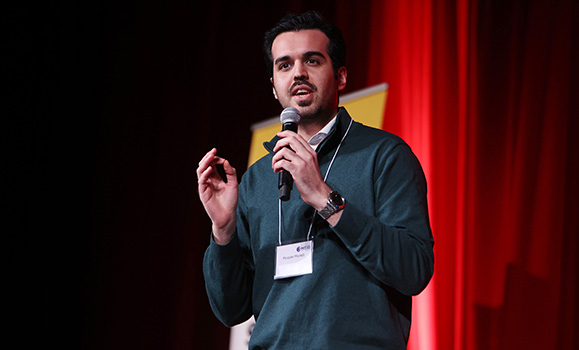
Pooyan Moradi.
Trumble placed third in the competition and won $250 with a presentation covering the differences in how people develop health problems as they age in relation to heart disease.
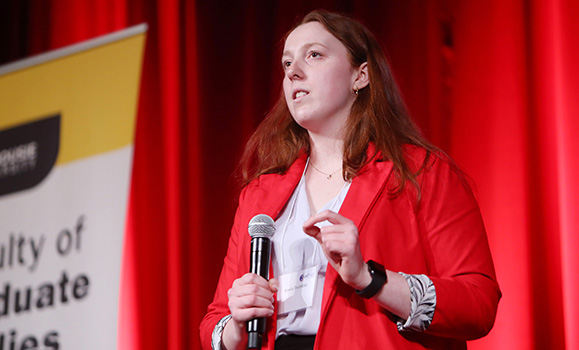
Kaela Trumble.
The remaining eight finalists each earned $100 prizes for their inspiring presentations.
Also receiving the most votes for the People’s Choice Award, biochemistry and molecular biology master’s student Dina Rogers captivated the crowd when describing a biological recycling process by which PET plastic can be repurposed into new materials by protein engineering to combat climate change. The award, valued at $500, was generously sponsored by Estelle Joubert, assistant dean of the Faculty of Graduate Studies, and entrepreneur Paul Doerwald.
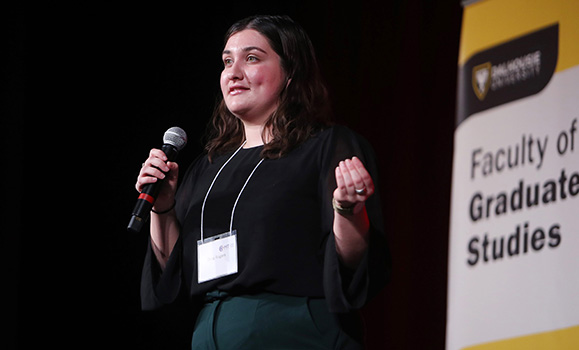
Dina Rogers.
Recommended reading: Where experience meets impact: Introducing Dalhousie’s 2023 Top Co‑op Students of the Year
Distilling big ideas
This year's 3MT finals opened with a traditional Mi'kma'ki welcome with Elder Ann LaBillois. The event was enthusiastically hosted by CBC reporter and video journalist Brett Ruskin for a sixth time.
Judges for the competition were Dr. Frank Harvey, Dal's provost and vice-president academic, Grace Jefferies-Aldridge, Dal’s vice-president, people and culture, and Kristan Hines, senior vice-president of corporate and public affairs at NATIONAL Public Relations.
Organized by the Faculty of Graduate Studies, the event served as an opportunity for members of the Dal community and beyond to learn about the impactful work the university’s graduate students are engaged in.
“For many of us, the 3 Minute Thesis competition is the highlight of the year at Dalhousie,” says Dr. Marty Leonard, dean of the Faculty of Graduate Studies. “It challenges students to take what could be very technologically or theoretically complex research — or better yet, both — and make it accessible and interesting to anyone.”
Dalhousie President Dr. Kim Brooks invited the crowd to relish the opportunity to celebrate the extraordinary research happening on campus.
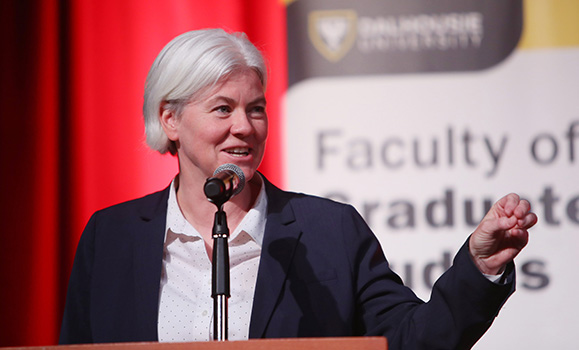
Dal President Kim Brooks.
“If you have the privilege of spending time in a university, one of the things you get to do often in your academic life is trace an idea back to its origins,” she says. “And almost every time you find a new idea, a unique contribution, and you trace it back to its origins, you find a graduate student.”
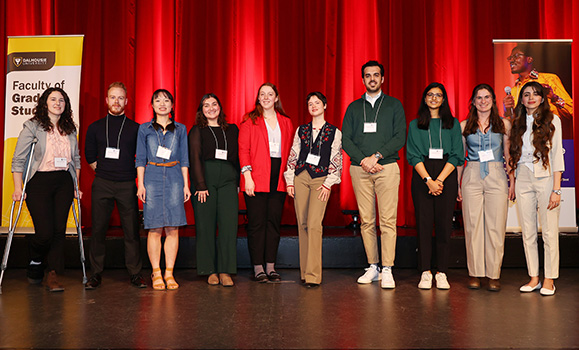
3MT finalists.
See below for a complete list of this year’s 3MT finalists and their presentations:
Dina Rogers, MSc, Biochemistry and Molecular Biology
Proteins vs. Pollution: A Biochemical Solution to a Brighter Future
Kateryna Rudenko, MES, Environmental Studies
Weaving Mi’kma’ki from Stories We Share
Joy Liu, MSc, Statistics
From Approximate to Accurate: Improving Sea Scallop Meat Weight Estimates in the Bay of Fundy through Statistical Modeling
Reynaldo Popoli, PhD, Medical Neuroscience
How a life changes forever in just 12 months
Kaela Trumble, MSc, Rehabilitation Research
How will your heart age?
Eniko Zsoldos, PhD, Chemistry
Improving Battery Sustainability by Limiting Charging
Divya Rathore, PhD, Physics and Atmospheric Science
Many Shades of Green
Sophie Inkpen, MSc, Kinesiology
Taking Action Through Activity: A Program for Patients with Acquired Brain Injury
Pooyan Moradi, PhD, Medical Neuroscience
Cloudy with a Chance of Epilepsy
Fatemeh Mahdizadeh Karizaki, PhD in Health
Promoting Health and Wellbeing: Access and Inclusion to Childcare and Early Learning for Children with Disabilities in Nova Scotia

